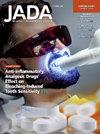家庭激励访谈:一项旨在提高智利弱势家庭口腔健康知识水平和降低发病率的社区试验。
IF 3.1
2区 医学
Q1 DENTISTRY, ORAL SURGERY & MEDICINE
引用次数: 0
摘要
背景:尽管以家庭为基础的干预措施在其他儿童和妊娠健康结果方面取得了成功,但有关这些干预措施对学龄前儿童或照顾者口腔健康结果的影响的证据却很有限。这项社区试验的目的是评估 12 个月后在智利贫困家庭中开展的家庭激励访谈(MI)干预对口腔健康结果的影响:该试验采用社区单盲设计,包括来自 2 个贫困社区的学龄前儿童(2-4 岁)及其照顾者,他们在幼儿园接受了激励式访谈干预或标准口腔健康干预。口腔健康管理干预包括由受过口腔健康管理培训的牙科卫生学家进行的 4 到 6 次有针对性的家访。在基线和 12 个月的随访中收集了有关社会经济-人口因素、龋病(国际龋病检测和评估系统 [ICDAS])、口腔卫生和护理人员口腔健康素养(OHL)(通过口腔健康素养工具和成人牙科素养快速评估,共 30 个项目)的数据:结果:252 个二人组完成了基线测量,212 个二人组完成了随访(对照组,104 人;干预组,108 人)。在基线(相关性小于 0.3)和随访中发现,临床社会人口学因素与 OHL 之间的相关性较弱。协方差分析表明,ICDAS评分超过0分的病灶龋齿发病率有所降低(P = .03),但ICDAS评分超过2分的病灶龋齿发病率没有降低(P = .47)。没有观察到口腔卫生方面的下降(P = .74)。口腔健康素养工具得分没有提高(P = .10),而成人牙科素养快速评估 30 项得分略有提高(P = .03):家庭传递式多元智能干预对学龄前儿童的龋齿发生率和看护者的口腔健康素养有微弱影响,但对学龄前儿童的口腔卫生没有影响,主要影响体现在龋齿 ICDAS 得分超过 0.00 分:实际意义:由牙科保健员进行的家庭传递式口腔卫生干预可略微降低弱势群体学龄前儿童的龋齿发病率。该试验已在澳大利亚和新西兰临床试验注册中心注册。注册号为 ACTRN12615000450516。本文章由计算机程序翻译,如有差异,请以英文原文为准。
Motivational interviewing at home
Background
Limited evidence exists regarding the effects of home-based interventions on oral health outcomes in preschool-aged children or caregivers despite the success of such interventions in other child and pregnancy health outcomes. The aim of this community trial was to assess the impact after 12 months of a home-delivered motivational interviewing (MI) intervention on oral health outcomes in disadvantaged Chilean families.
Methods
This trial was conducted with a community single-blinded design, including preschoolers (aged 2-4 years) and their caregivers from 2 disadvantaged communities who received either the MI intervention or standard oral health interventions at kindergartens. The MI intervention comprised from 4 through 6 tailored home visits by MI-trained dental hygienists. Data on socioeconomic-demographic factors, caries (International Caries Detection and Assessment System [ICDAS]), oral hygiene, and caregivers’ oral health literacy (OHL) (assessed with Oral Health Literacy Instrument and Rapid Estimate of Adult Literacy in Dentistry, 30 items) were collected at baseline and 12-month follow-up.
Results
Two hundred fifty-two dyads completed baseline measurements, and 212 completed the follow-up (control, n = 104; intervention, n = 108). Weak associations were found between clinical-sociodemographic factors and OHL at baseline (correlations, < 0.3) and follow-up. Analysis of covariance revealed a reduction in caries incidence for lesions with ICDAS scores above 0 (P = .03) but not for ICDAS scores above 2 (P = .47). No reduction in oral hygiene was observed (P = .74). Oral Health Literacy Instrument scores showed no improvement (P = .10), and Rapid Estimate of Adult Literacy in Dentistry, 30 items scores showed a marginal increase (P = .03).
Conclusions
Home-delivered MI intervention had a marginal impact on preschoolers’ caries incidence and caregivers’ OHL but no effect on preschoolers’ oral hygiene, with the primary impact observed at the level of caries ICDAS scores above 0.
Practical Implications
Home-delivered MI interventions by dental hygienists marginally reduce caries incidence in preschoolers from disadvantaged populations. This trial was registered at the Australian and New Zealand Clinical Trials Registry. The registration number is ACTRN12615000450516.
求助全文
通过发布文献求助,成功后即可免费获取论文全文。
去求助
来源期刊

Journal of the American Dental Association
医学-牙科与口腔外科
CiteScore
5.30
自引率
10.30%
发文量
221
审稿时长
34 days
期刊介绍:
There is not a single source or solution to help dentists in their quest for lifelong learning, improving dental practice, and dental well-being. JADA+, along with The Journal of the American Dental Association, is striving to do just that, bringing together practical content covering dentistry topics and procedures to help dentists—both general dentists and specialists—provide better patient care and improve oral health and well-being. This is a work in progress; as we add more content, covering more topics of interest, it will continue to expand, becoming an ever-more essential source of oral health knowledge.
 求助内容:
求助内容: 应助结果提醒方式:
应助结果提醒方式:


